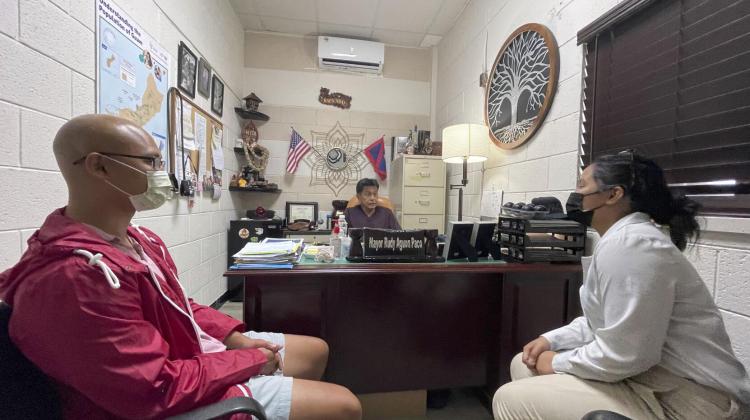Reflecting on Decolonial Participatory Action Research

Image credit: Guåhan Survey Team
Participatory action research (PAR) is a research methodology which prioritizes community input. A defining characteristic of successful PAR incorporates everyday community residents as key co-producers of knowledge and as designers of the research process at every step. These resident participants are often called resident researchers –– distinguished by their lack of formal research training and their long-term experiential knowledge of the communities included in the research. Much of the literature surrounding PAR directs how PAR studies should be designed (process) and how PAR can empower the voices and priorities of marginalized communities (group-level outcomes). Yet little space has been held for understanding how PAR research can enable personal transformations within research teams, particularly in Indigenous nations struggling for sovereignty over their own lands and waters.
A new paper in Environment and Planning F provides a case study of a recent decolonial PAR project in Guåhan to explore how resident researchers are personally transformed through their involvement in PAR, in ways that strengthen local Indigenous sovereignty movements. Guåhan, more commonly known as Guam, is a modern-day colony and an unincorporated territory of the United States. The 2021 Guåhan Survey, conducted in July-August 2021, provided a platform for Chamorus - the Indigenous peoples of Låguas yan Gåni – or the Mariånas archipelago - to express their thoughts and concerns about Guåhan’s political future. Led by and for the Indigenous Chamoru peoples, it is currently the largest-scale survey of Chamoru political attitudes towards decolonization.
The authors of the paper include DUSP’s Kevin Lujan Lee (familian Capili); Hawai‘i Pacific University’s Ngoc Phan and Nikki Aubree San Agustin; as well as University of Guam’s Nolan Flores, Josiah Gabriel Mesngon, Aria Palaganas, and Chauntae Quichocho.
“Social scientific research on Indigenous peoples overwhelmingly tells a story that centers on our deficits: our disproportionately poor health and socioeconomic outcomes, our low voting registration and voter turnouts etc. The 2021 Guåhan Survey tells a different story: it asks about our reflections on Chamoru identity, our opinions on self-determination, our uncertainties about the future, and our thoughts about the complex relationship between Guåhan and the United States,” said Lee. “With the caveat that Chamorus are deeply heterogeneous and that our survey does not provide an official or representative portrait of the Chamoru peoples in Guåhan, we found that the majority of Chamoru respondents feel immense pride in being Chamoru, but feel like second-class citizens in the United States: approximately nine in ten respondents reported feeling good about their Chamoru identity and feeling a sense of belonging to our Chamoru community, and almost three-quarters of respondents feel like they do not have the same rights as U.S citizens who are residents of one of the 50 states.”
Lee is a Chamoru PhD candidate in urban planning and politics whose work engages the contemporary Indigenous politics of decolonization in Oceania (the Pacific Islands) and 21st-century empires (especially the United States and Aotearoa/New Zealand).
“We hope that this paper illustrates the real-world political stakes of decolonial PAR: when researchers incorporate Indigenous peoples at every stage of our research processes, and when we ask questions that pertain directly to ongoing Indigenous sovereignty struggles against colonialism and imperialism, we can make a difference in real-world Indigenous politics. We saw this in our incredible resident researchers, who cultivated an increasingly intimate vocabulary to speak about their relationship with decolonization, and gained confidence to lean into their indisputable expertise as decolonial researchers in their own right. PAR is still on the fringes of social science methodologies, and future work should continue to explore why and how it matters––especially for Indigenous peoples.”


